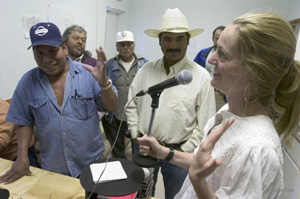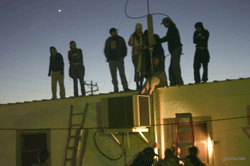DominionSections
Browse Articles
- IndependentMedia.ca
- MostlyWater.org
- Seven Oaks
- BASICS Newsletter
- Siafu
- Briarpatch Magazine
- The Leveller
- Groundwire
- Redwire Magazine
- Canadian Dimension
- CKDU News Collective
- Common Ground
- Shunpiking Magazine
- The Real News
- Our Times
- À babord !
- Blackfly Magazine
- Guerilla News Network
- The Other Side
- The Sunday Independent
- Vive le Canada
- Elements
- ACTivist Magazine
- The Tyee
- TML Daily
- New Socialist
- Relay (Socialist Project)
- Socialist Worker
- Socialist Action
- Rabble.ca
- Straight Goods
- Alternatives Journal
- This Magazine
- Dialogue Magazine
- Orato
- Rebel Youth
- NB Media Co-op
Radio
Barn-Raising on Air: the Prometheus Radio Project
December 22, 2003
Barn-Raising on Air: the Prometheus Radio Project

Prometheus Radio Project volunteers working with the Coalition of Immokalee Workers to build Radio Consciencia. photo: JJ Tiziou
I was working for CHMA Radio in Sackville, NB when I first heard about the Prometheus Radio Project in West Philadelphia. Apparently a radio pirate named Pete TriDish had mobilized low-power radio supporters in an attempt to challenge the Federal Communication Commission's ban on new low power stations. Hiding out in an attic for 2 years, clandestine Radio Mutiny beamed through West Philly neighborhoods shaking a modulated fist at the FCC, the media regulatory body in the United States. Community radio advocates claim preferential treatment is given to multi-million dollar Big Media owners while low power, community-based FM hopefuls are forced to broadcast illegally or not at all. In 1998, the FCC literally kicked down the studio door and seized Radio Mutiny's transmitter. As the FCC dismantled what was Philadelphia's only volunteer-run, community radio station, Prometheus Radio Project emerged from the cinders.

photo: JJ Tiziou
In 2000, pressure from community radio advocates forced the FCC to open a window for low-power FM radio license applications in late 2000. This was a one-time only window, and the FCC was flooded by hundreds of thousands of applications, which, in 2003, they are still processing. Under the act, new LPFM stations could not be placed on frequencies that were three channels removed from an existing station, eliminating about 75% of opportunities of the frequencies available for new LPFM stations. However, hundreds of applicants in rural areas were granted low-power licenses as they posed little threat of signal interference.
The Coalition of Immokalee Workers, a community-based farmworker organization in southwest Florida, was a successful low-power radio applicant. From December 5-7, Prometheus Radio Project barn raised its fifth low-power/community radio station. Like an old fashioned gathering where neighbors pitch in to construct a building, CIW's Radio Conciencia in Immokalee, Florida was assembled by volunteers, from the antennae mast to the microphones. The station will be an integral tool in CIW's struggle to organize migrant farmworkers . Their members are largely Latino, Haitian, and Mayan Indian immigrants working in low-wage jobs throughout the state of Florida. They fight for fair wages and the right to organize.
When Pete TriDish, Sue and I pulled into Immokalee a couple days before the barn raising was to begin,
Everything seemed incredibly unresolved. About 100 or so volunteers from across the country were about to arrive in Immokalee for the barn raising and CIW hadn't yet decided where the new studio was to be. But who can blame them? CIW had just returned from a 34 mile march from Fort Lauderdale to Miami to protest FTAA meetings. Just months before, they had organized a 10 day hunger strike in front of Taco Bell headquarters, protesting the franchise's refusal to pay an extra penny per pound for tomatoes.
"An organization just like Prometheus," Pete said "They're too busy to do anything but fly by the seat of their pants!" As I headed out to scour pawn shops for decent cassette decks for the new station, I had an internal freakout. How would we be on the air in 3 days?
In the end, we all became honorary midwives by pitching in and sharing whatever skills we've picked up along the way, birthing a radio station in the process. Communication was a two-way rush of Spanish and English as the mast was raised, the board was wired and cables were soldered. Workshops about interviewing, radio production and governance happened in behind construction scenes. Experienced radio gurus worked with keen beginners to teach skills and pass on information. The Prometheus barn raising philosophy puts emphasis on skill sharing and teaching rather than simply having engineers build the whole station.
On Sunday at 7:15pm, members of CIW sat behind the microphone and began the inaugural broadcast of Radio Conciencia. First words spoken were a mixture of disbelief and celebration.
In the past 2 days, we had experienced the magic of community collaboration. In a time when the airwaves are becoming increasingly monopolized, Radio Conciencia represents an accessible space and a powerful local resource, as well as a viable model for other communities.
--
Related articles:
By the same author:
Archived Site
The Dominion is a monthly paper published by an incipient network of independent journalists in Canada. It aims to provide accurate, critical coverage that is accountable to its readers and the subjects it tackles. Taking its name from Canada's official status as both a colony and a colonial force, the Dominion examines politics, culture and daily life with a view to understanding the exercise of power.